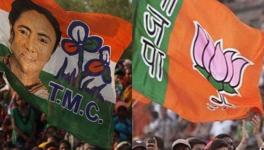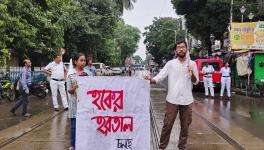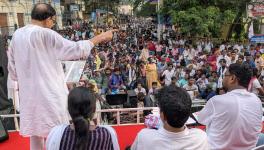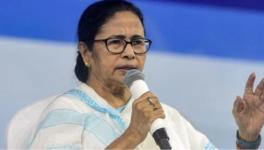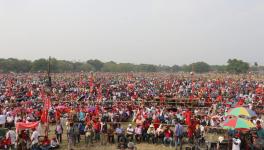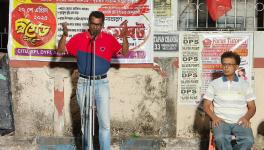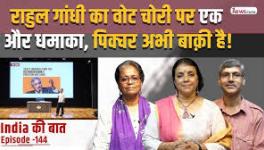Guerrilla 'Lawfare' in the Darjeeling Hills
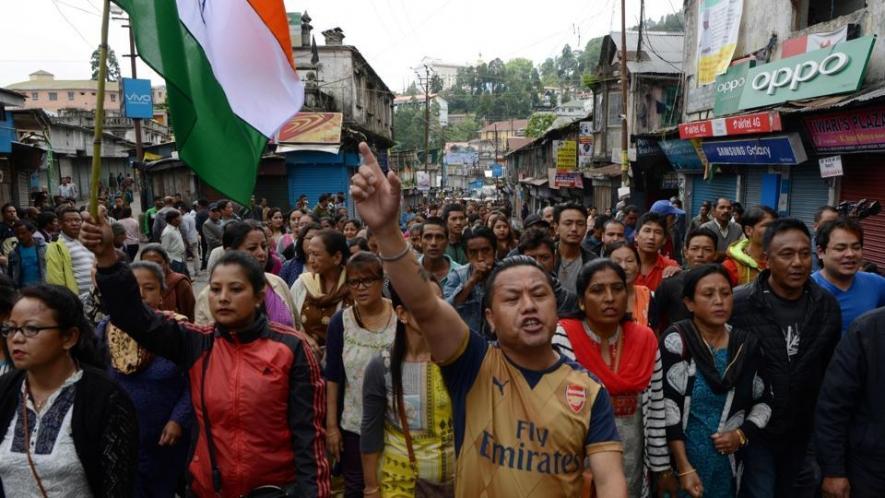
Striking off the names of the Gorkha Janmukti Morcha's (GJMM) Bimal Gurung and Roshan Giri along with their family members from the electoral rolls in Darjeeling can have disastrous consequences for the hills. This comes amidst rumours that Gurung was planning to contest the 2019 Lok Sabha elections from the Darjeeling constituency. The Bimal Gurung led GJMM had been at the forefront of the 2017 agitation for Gorkhaland until the party split due to deft politics played by the West Bengal Chief Minister, Mamata Banerjee.
Read More: In Viral Audio, Bengal ‘Cop’ Threatens to Rape Gorkhaland Activist’s Kin
Allegations had been piled onto the then leadership of the GJMM during the 2017 agitation ranging from sedition to waging war against the state. Some of the allegations even accused the GJMM leaders of killing their own party members – though the people of the hills know that those who were killed fell to police firing. Bimal Gurung had unsuccessfully petitioned the Supreme Court in the matter of the multitude of charges heaped upon him and his supporters. By then the party had split into the Bimal Gurung – Roshan Giri and the Anit Thapa – Binay Tamang led factions. However, with Gurung and Giri gone underground, the Anit Thapa led faction proceeded to consolidate power. They coerced and cajoled those who sided with Gurung to join their camp. With Chief Minister Banerjee's blessings, the GJMM effectively transformed itself from a party working for Gorkhaland into an extension of the Trinamool Congress (TMC).
Read More: Rebel GJM Leader’s Chamling Salvo Draws Flak in Darjeeling
The deletion of names from an electoral roll is not unheard of. In 2017, Atal Bihari Vajpayee's name was struck off the rolls in Lucknow. The reason was that he had not resided there for the past six months. Under rule 21A of the Registration of Electors Rules, 1960, names can be struck off the rolls if the person is not ordinarily resident at the place where their name appears on the rolls. Section 20 of the Representation of the People Act, 1950, lays down what constitutes being 'ordinarily resident'. The criteria of being resident for the past six months does not apply to those in government service and the armed forces. The significance of having one's name on the electoral rolls of a constituency is that it is a criteria for being able to contest from that constituency. Therefore, it is not a question of whether striking off their names was illegal, but rather that the motivations for doing so are questionable.
The interesting note is that the GJMM rival camp has been eerily silent on these developments. However, Gurung's former political opponents have raised their voices against it. Neeraj Zimba Tamang, the Spokesperson of the Gorkha National Liberation Front (GNLF) called the exercise an 'injustice' that must be opposed. The GNLF was previously the main political power in the hills of which Bimal Gurung was a part, however, Gurung rebelled against the party and formed the GJMM in 2007. There had been internecine clashes between the two during the period until the GJMM was established as the main force in the hills.
One could speculate that the reason for striking off the names from the rolls was due to the fact that Gurung had become a liability for the government of West Bengal. The TMC government had successfully managed to control him and the GJMM since 2015 after Bimal Gurung and other leaders of the GJMM were charged with the murder of Madan Tamang. Madan Tamang was a political opponent of the GNLF as well as the GJMM, he led the All India Gorkha League and was a powerful orator. After he was murdered in broad daylight in 2010 the suspicion fell on Gurung, particularly since he had a history of violence as a part of the GNLF's armed movement in the 1980s. One of the rumours in the hills surrounding Tamang's murder was that he was going to speak publicly and expose Gurung for his criminality. Another rumour is that the assassin disappeared from police custody in the plains, thus, raising questions over whether Gurung was actually responsible.
Read More: Gorkhaland: From the Streets to the Supreme Court
However, the massive public support for the statehood movement in 2017 had caught everyone off guard. Despite supplies of food and medicines being stopped in the plains from reaching Darjeeling, the shutdown lasted a record 104 days. The litany of charges piled against the GJMM leadership and their refusal to lift the shutdown until they could hold talks with the union government probably led the government of West Bengal to create new leaders to speak for the party. At present the West Bengal government has succeeded in 'pacifying' the hills by appointing spokespersons for the people.
Read More: Tilting the Balance in Favour of Positive Law
However, the idea of a separate state is addictive. Some thought it had been 'managed' after the formation of the Darjeeling Gorkha Hill Council (DGHC). Yet in 2007, a new agreement had to be formed and the Gorkhaland Territorial Administration (GTA) came into being. One may wonder whether if it had not been for self-serving leaders, statehood could have been attained. Further, since the Darjeeling Hills are not as 'underdeveloped' as some other parts of West Bengal, the agitation for statehood cannot be framed within the paradigm of 'economic deprivation'.
Though the movement has had a very confused inception – for example nobody is clear on who a Gorkha is – it has managed to sustain itself on the aspirations of the common people. In 1986 the government of West Bengal came out with an 'information document' on the Gorkhaland Agitation. The document was based on colonial era writings on the hills, and predictably named the Lepchas as being the sole 'indigenous' inhabitants of the hills. The document further labelled the Nepali speaking population as 'immigrants'. Subsequent scholarship based on old Tibetan sources has put to rest the notion that the Lepchas are the sole indigenous inhabitants of the region. However, the other communities that make up the milieu of known 'original inhabitants' all fall within the category of 'Nepalis'.
Another point raised by the 'information document' is that the movement is being supported and funded by some 'outside forces', however, in the absence of publicly available material on this point, one cannot comment. Yet for some reason, the 'outside forces' argument has been raised ever since. During the agitation during the TMC rule, the Chief Minister time and again alleged that the movement had links with Maoists and Northeast militant groups. Though there have been a few arrests in this regard – in 2016 there was an arms haul at the Assam - West Bengal border involving a GTA administrator Sanjay Thulung–, it is likely that these were merely desperate attempts at forming links.
What the current state of affairs does display is that the government of West Bengal is nervous about Gurung remaining on the electoral rolls. This becomes clearer as neither Anit Thapa nor Binay Tamang were elected to the new GTA. If Gurung were to contest any poll, be it to the Lok Sabha or a local body, it is likely that he would win. The reason being that the hounding he received at the hands of the government of West Bengal and the absence of any armed movement could lead a common voter to believe that the allegations against him are concocted. It further reinforces Gurung's victimhood, something he has of late been able to employ effectively.
Get the latest reports & analysis with people's perspective on Protests, movements & deep analytical videos, discussions of the current affairs in your Telegram app. Subscribe to NewsClick's Telegram channel & get Real-Time updates on stories, as they get published on our website.










